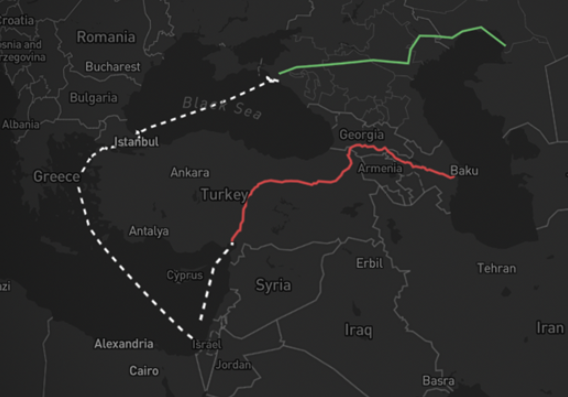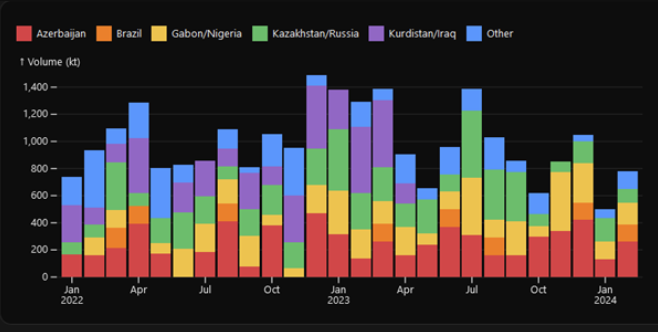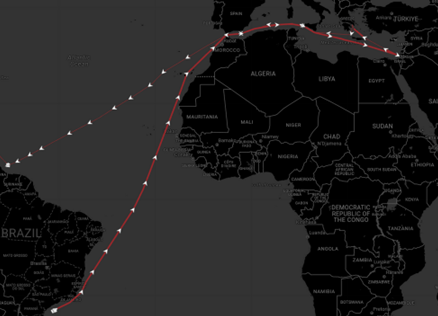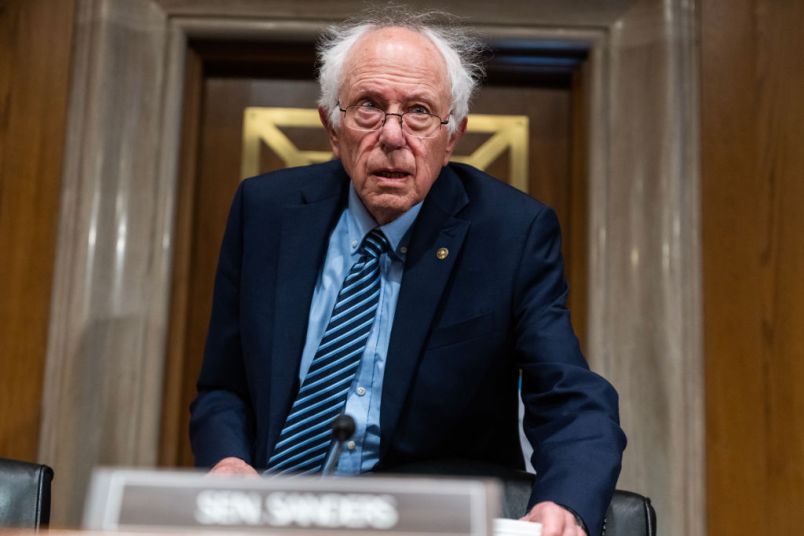BRICS and Israel’s ongoing energy supplies

First published at Their Anti-imperialism and Ours.
It is well-known that Israel’s Gaza genocide is principally enabled by the constant supply of tens of billions of dollars of killing equipment by the United States, making it the principle accomplice in the genocide, with Germany coming in a close second.
An important secondary question, however, is that of who continues to supply most of the state’s oil and coal (Israel has its own Mediterranean gas supplies) that keep the Israeli economy and war machine running. It may surprise some that the main culprits have been publicly critical of Israel’s actions, including BRICS members Russia, Brazil, Egypt and China, as well as some who have condemned Israel most furiously, such as BRICS member South Africa and, indirectly, Turkey.
According to S&P Global in late October 2023:
With almost no domestic crude or condensate production, Israel has been importing around 300,000 b/d of crude this year to process at its two refineries in Haifa and Ashdod. Israel’s biggest source of oil is the Kazakh-sourced CPC Blend crude exported via Russia’s Black Sea port of Novorossiisk and Azeri Light which is shipped from Turkey’s Mediterranean port of Ceyhan. Together they accounted for over half of Israel’s crude imports this year [emphasis added].

It is worth breaking this down a little more. First, even with regards to fuel, the US is also a supplier, mainly of refined JP-8 Jet Fuel for Israel’s killer jets, as part of US military aid to Israel; three tankers of jet fuel have arrived since October. Before the war, the only other form of refined fuel Israel imported was from BRICS member and rabid Israel-ally India, which supplied diesel, but this has fallen off, not due to good intentions, but rather due to the Red Sea blockade by AnsarAllah authorities in north Yemen. Regarding India, it is worth adding that an Indian-Israeli joint-venture has been producing Hermes 900 UAV attack drones and providing them to Israel; India has also been providing large numbers of rockets and explosives to Israel. Indian leader Modi is, of course, a close ally of his “dear friend” Vladimir Putin as he described him in his recent trip to Moscow.
Besides refined fuel, “Israel’s military requires significant quantities of diesel and gasoline for tanks and other military vehicles” which “ is supplied by Israel’s refineries” in Ashdod and Haifa, which rely on imported crude oil. This is where Azeri, Russian-Kazak, Brazilian and Egyptian crude comes in, alongside growing supplies from Gabon/Nigeria.
This bar chart shows the main suppliers of crude to Israel over 2022-24:

Azerbaijan-Turkey and the BTC pipeline
Azerbaijan has been a major supplier of oil to Israel for many years, as part of a two-way arrangement in which Israel supplies Azerbaijan with guns. The basis of this cozy arrangement is Azerbaijan’s fraught relationship with neighbouring Iran; Azerbaijan’s three-decade autocrat Aliev runs a secular dictatorship, but as Azerbaijanis are largely Shiite, he fears the influence of Iran’s fundamentalist Shiism; while Iran itself includes a very large Azeri minority, and Iran in turn fears Azerbaijan’s potential influence there. Though this has not prevented some growing Iran-Azerbaijan cooperation, particularly on the International North-South Transport Corridor running from Russia, via Azerbaijan into Iran and out into the Indian Ocean to the Indian city Mumbai, nevertheless this arms for oil Israel-Azerbaijan arrangement has stood the test of time.
Israeli arms played a decisive role in facilitating Azerbaijan’s reconquest of the Armenian-populated Ngorno-Karabakh region in 2023, which led to the flight of 90 percent of the population.
The problem is that for landlocked Azerbaijan to get its oil to the Mediterranean Sea, it must go through Turkey via the BTC (Baku-Tsibilisi-Ceyhan) pipeline; while long ago a reliable ally of Israel under the Kemalist military, Erdogan’s Islamist AKP regime turned markedly anti-Israel and pro-Palestine since coming to power in 2003. But this did not prevent long-established, large-scale Turkish-Israeli trade from flourishing, indeed Turkey had been Israel’s fifth largest trading partner; and above all Azerbaijani oil has continued to flow through Turkey to Israel.
Erdogan’s regime finally put its money where its mouth is in May 2024, cutting off all Turkish trade with Israel. However, given the international agreements involved with Azeri oil and the BTC pipeline (BP is the major shareholder along with Equinor, Eni, Total, Exxon and the Azeri oil company, while the Turkish oil company TPAO only holds a 6.5 percent stake), Turkey would find it very difficult to prevent Azeri oil going through to Israel, without forcing a legal showdown and by all accounts this oil continues to flow to Israel.
As such, while Erdogan tells a gigantic state-organised march that Hamas is a “ national liberation movement”, calls for a genocide trial for Netanyahu and claims there is “ no difference between Netanyahu and Hitler,” while Turkey was the first country to formally join South Africa’s genocide case against Israel in the International Court of Justice (ICJ), and while finally ending trade relations, Azeri oil traversing Turkey still accounts for some 40 percent of Israel’s crude imports.
Kazakhistan, Russia and the CPC pipeline
The other major source of Israel’s crude imports has been from Kazakhistan, which, like Azerbaijan, is landlocked; in this case Russia takes the place of Turkey, with Kazakh oil entering the Black Sea at Russia’s port of Novorossiysk via the Caspian Pipeline Consortium (CPC). Israel also exports drones, precision rockets, radar systems and communications equipment to Kazakhistan, as well as the spyware technology of the NSO Group, with which the autocratic Kazakh regime infects the phones of dissidents. Kazakhistan is a close Russian ally and a member of the Shanghai Cooperation Organisation (SCO).
Notably, in contrast to Turkey, Russia is not merely a transit territory but the major investor and minor supplier itself. Some 44 percent of CPC shares are owned by Russian companies, above all the state-controlled, joint-stock company Transneft, the largest oil company in the world which alone owns a quarter of CPC, alongside Lukoil (12.5 percent) and Rosneft (7.5 percent); other shareholders include Chevron, Exxon, Shell, Eni and Kazakh oil companies (20 percent). Likewise, “CPC oil is a blend made up of oil from major fields in and around both the Kazakh and the Russian sections of the Caspian Sea, as well as smaller onshore fields in southern Russia. The majority is Kazakh, and cargoes are given either a Kazakh or a Russian certificate of origin in overall proportion to the amounts of oil that are shipped through the system from each country.”
As we see in the chart above, in July-September 2023, CPC supplied some 40 percent of Israel’s oil imports; while it has fluctuated since, in January 2024 it still accounted for some 40 percent of the total. The data shows that at least 600kt of Kazakh/Russian crude has been shipped to Israel since October via the CPC.
Despite Russia’s verbal criticism of Israel’s actions, the only unlikely danger to the CPC supply would be not Russian government policy but western sanctions on Russia over Ukraine (sanctions which Israel does not take part in), but “the importance of Caspian Sea oil and gas to US firms ExxonMobil and Chevron — and the lack of viable alternative export routes — has so far saved the CPC system from Western sanctions, and there is no reason to suspect that this will change in the near future.”
In addition, Russia also exports ‘dirty’ petroleum products to Israel, notably VGO fuel oil, which is upgraded into jet fuel (!) and diesel, and “this flow does not seem to have been affected by recent events, with four cargoes having reportedly arrived since 13 October 2023,” carrying 120 kt. Russian VGO has been impacted by EU sanctions, probably making the Israeli market for VGO even more important today.
Finally, Russia is also an important supplier of coal to Israel, exporting 247,500 mt to Israel in the first half of 2014, second only to Colombia, which in June banned coal exports; more on this below.
Interestingly, both Turkish and Russian trade with Israel was jointly highlighted on June 9 when the Turkish cargo vessel Yaf Horizon caught on fire in Haifa harbour. It was somewhat embarrassing because this was after Turkey’s trade ban, indicating that some Turkish companies have attempted to get around the ban (indeed some circumvent it by re-routing through Greece, which is currently strongly allied to Israel on an anti-Turkey platform). The vessel had first docked at Russia’s Novorossiysk port, where it picked up Russian iron or steel for export to Israel.
Where does Israel-Russia collaboration stand at present?
Of course, there ought to be nothing surprising about Russia supplying, and facilitating the supply of, oil to Israel, given the long-term close relationship between the two countries. During Israel’s ‘Operation Protective Edge’ Gaza blitzkrieg in 2014, which killed 2500 Palestinians, Putin declared “I support the struggle of Israel,” while Israel refused to join its western allies in condemning the 2014 Russian annexation of Crimea, abstaining in the UN and rejecting sanctions.
Following the onset of the Syrian uprising against Assad since 2011, Israel continually stated its preference for Russia’s ally Assad to prevail against his opponents; Israeli leaders expressed appreciation of the Assad dynasty maintaining quiet on the Golan for 40 years; the Syrian opposition (which is also dedicated to recovering the Golan) never asked for Israeli support and Israel never offered it; and in 2018, Israel actively facilitated Assad’s reconquest of the south, alongside Trump and in coordination with Putin. Israel later stepped up attacks on Iranian and Hezbollah forces, which had helped rescue Assad, after Assad had reconquered much of the country, making their aid less essential, but Israel had welcomed the onset of Russian terror bombing to save the regime in 2015, hoping for a Russian-dominated rather than Iranian-dominated regime. Putin and Netanyahu then met more than any other two leaders over the next half-decade, Russian-controlled air defences in Syria allowing these Israeli attacks on Iranian assets. Under Netanyahu, Israel authorized the ‘Cellebrite’ company “to sell its mobile phone hacking device to the Investigative Committee of the Russian Federation, which serves President Putin as a key tool of internal repression and political persecution in the country.” Netanyahu even produced a massive billboard showing himself with Putin for the 2019 elections.
It was hardly surprising that Netanyahu’s equally ultra-rightist successor, and former ally, then prime minister Naftali Bennett, was the first ‘world leader’ to make a high level visit to Moscow to meet Putin after his invasion of Ukraine. Bennett’s first statement following Russia’s invasion merely affirmed Ukraine’s right to sovereignty, but made no mention of Russia. Following US pressure, foreign minister and ‘moderate’ Zionist Yair Lapid issued the official, half-hearted condemnation. Bennett then issued a demand that his ministers say nothing; rejected Ukraine’s calls for arms, blocked any attempt by third parties to send Israeli-made arms to Ukraine, and blocked the US from providing Israeli ‘iron dome’ missile shield technology to Ukraine. Despite two and a half years of pressure from Israel’s main ally, the US, Israel has still not sent a gun to Ukraine. Even in January 2024, Israel rejected US requests for it to supply some very old (supplied to Israel in the 1960s) anti-aircraft weaponry to the US for it to give to Ukraine. Not long before October 7, Russia announced the opening of its consular offices in West Jerusalem, which it had recognised as Israel’s capital several years earlier, despite that city’s illegal incorporation of East Jerusalem.
Following the onset of the Gaza genocide in October 2023 however, these powerful Russian-Israeli relations began to fray. The above demonstrates that this was not because of any problem with Israel as such, but rather was related to Russian-American rivalry. For nearly two years, the US, for its own imperial reasons, had led support for Ukraine’s legitimate struggle for self-determination against Russia’s illegal and barbaric war of aggression. Now it was Russia’s chance to turn the tables, criticising the US for its 100 percent support for Israel’s absolutely apocalyptic actions, showcasing Russia’s more “balanced” view of the Mideast crisis, blaming the US for not having brought about the ‘two-state solution’. While Putin’s target is the US rather than Israel as such, this discourse by definition means criticism of Israel, resulting in damage to Israeli-Russian relations.
While much analysis suggests this is due to the growing relationship between Russia and Iran (eg with Iranian provision of killer-drones for Moscow’s war in Ukraine), in reality Russia (and China) merely place themselves in the exact ‘Arab mainstream’ on these issues alongside their BRICS allies Egypt, Saudi Arabia, the UAE etc – recognition of Israel, calls for ‘two-state solution’, supporting UN ceasefire resolutions, condemnation of the October 7 attack as an “ absolutely unacceptable terrorist attack against Israel,” demanding the unconditional release of all Israeli hostages, strong support for the collaborationist Palestinian Authority, refusal to join South Africa’s ICJ case against Israel and so on. Russia’s mild change of stance has not led to even one Israeli warplane being shot down by Russian-controlled air defence while attacking pro-Iran targets in Syria. Meanwhile, in contrast to the active Israel-Lebanon border, the Syria-Israel Golan demarcation line “ remains conspicuously calm,” the Syrian regime having instructed its forces in the Golan “ not to engage in any hostilities, including firing bullets or shells toward Israel.” To keep it that way, Russia has beefed up its forces along the Golan occupation line to ensure no stray Palestinian or Iran-backed forces cause any trouble.
Of course, the shallowness of Russia’s public criticism of Israel can be gleaned from some of the more serious Russian commentary, such as Foreign Minister Sergey Lavrov’s December 28 interview, in which he directly compared Russia’s and Israel’s campaigns in Ukraine and Gaza by using Russia’s Orwellian terms to describe its own invasion: “Prime Minister Benjamin Netanyahu announced that Hamas must be destroyed as a whole and as a military force. It sounds like demilitarisation. He also said that extremism must be eliminated in Gaza. It sounds like denazification.” He then went on to commend Netanyahu for not criticising Russia’s war in Ukraine.
In this light, Russia’s provision and facilitation of a major part of Israel’s oil and coal supplies should not be any surprise, but in case anyone were taken in by its newly critical position towards Israel, these material facts are a reminder of reality.
Iraq, Egypt and Brazil
Until April 2023, Iraq’s Kurdistan Regional Government was also an important oil exporter to Israel, again traversing Turkish territory to Ceyhan, but a legal dispute between the KRG and the Iraqi government halted this flow. The main sources making up for this loss have been Gabon and Nigeria, Brazil and Egypt.
BRICS member Brazil is another important supplier of crude to Israel, with two shipments of 260,000 tons delivered to Israel in December 2023, and February 2024. This crude was supplied from oil fields owned by Shell, TotalEnergies and Brazil’s Petrobras. This is despite the Lula government’s sharp criticism of Israeli actions, leading to the withdrawal of Brazil’s ambassador to Israel in late May and expression of support to South Africa’s genocide case against Israel in the International Court of Justice (ICJ), at one point Lula even calling the Israeli military campaign ‘genocide’.

Finally, Israel imports a small but regular amount of oil from its BRICS neighbour Egypt, via Sidi Kerir, near Alexandria, the terminus of the SUMED pipeline. Oil from BRICS members United Arab Emirates and Saudi Arabia, as well as Iraq, also feeds into this pipeline. Many might say, this is no surprise, Egypt being the first Arab state to recognise Israel, the irony being that many ‘anti-imperialist’ critics believe BRICS to be the answer to US imperialism – yet BRICS members Russia, China, India, Brazil, South Africa, United Arab Emirates and Ethiopia, like Egypt, all have long-term relations with Israel; only Saudi Arabia and Iran do not. Words are good, but oil profits are another thing, of course.
Of course, it is certainly true that the al-Sisi dictatorship has collaborated with the Israeli blockade of Gaza for years, and now blocks Palestinians fleeing from Gaza not to prevent the new Nakbah, but because the regime hates Palestinians as much as Israel does. But alarmed by the impact Israel’s genocide on its borders was having on its own population, Egypt announced in May it was formally joining South Africa’s genocide case against Israel in the ICJ, alongside Turkey and Colombia. But of course, like the others, Egypt still draws the line at actually taking any concrete action.
Coal: Russia, China, South Africa to the rescue
On June 8, Colombia’s President Gustavo Petro announced that his country would suspend coal exports to Israel – Colombia had on average supplied about 50-60 percent of Israel’s coal. Israel had imported 1.4 million mt of thermal coal in 2024 to date, of which Colombia supplied 855,700 mt, or 60 percent of Israel’s coal imports.
But according to S&P Global Global Commodities at Sea data, Russia was next, exporting 247,500 mt to Israel in that period, fellow BRICS member South Africa next at 169,200 mt, then the US at 86,100 mt and BRICS member China with 53,000 mt.
As discussed above, there is nothing out of the ordinary in Russia’s case, but an intriguing incident may cast some light on what more may be happening below the surface. On June 12, the Houthis launched a small watercraft, drone and missile attack on the Greek-owned, Liberian-flagged vessel M.V Tutor, sinking it. The Tutor was, or had been, carrying 80,000 tons of Russian coal, loaded at Ust-Luga, near Saint Petersburg; it was on its way to India after traversing the Suze Canal. While the Houthis have not exactly been precise in their choice of attacks – they claim to only attack vessels trading with Israel, yet hits have included ships carrying grain to their ally, Iran, twice, and a Chinese ship carrying Russian oil to India – it is likely that even such hits are based on erroneous assumptions. What may have caused an attack on such a large shipment of Russian coal?
On this, Patrick Bond from the University of Johannesburg speculates that “This may be because MV Tutor had apparently stopped at Jordan’s Aqaba New Port, where it seems that coal can be quickly unloaded and transported, either up the Jordanian highway seven hours distant to cement factories where it serves as a fuel, OR perhaps across the nearby Israeli border at the Rabin Crossing, from where around four hours away by truck, the coal can be sent to storage depots next to the Rutenberg coal-fired power plant, which normally served by ships unloading directly at Ashdod. Next door, Ashkelon’s port has been closed because it’s just 4km from Jabalia in Gaza.”
In the case of China, there should be few surprises there, given China is Israel’s second largest trading partner, and is part-owner of Israel’s port of Haifa (along with India), this making Israel a key link in China’s massive Belt and Road Initiative. Indeed, Israel is the third-largest export market for Chinese cars, and while China’s EV exports to Israel already made up 60 percent of the Israeli market in 2023, in the first 4 months of 2024 this rose to 70.8 percent, despite the Houthi blockade of the Red Sea! China-Israel technology relations have been booming for years (as the official organ of the CCP boasts), and one regular kind of US-Israel dispute has concerned Israeli attempts to sell advanced weaponry to China – where Israel has backed down under intense US pressure.
South Africa, however, was widely commended for its genocide case against Israel at the International Court of Justice, but till now has also had extensive trade relations with Israel, exporting $350.9 million to Israel in 2022, of which 40 percent was coal. To date there are no indications of steps being taken to end these coal supplies to Israel, and with the new governing coalition between the ANC and the pro-Zionist Democratic Alliance, this seems even less likely to change.
Thus despite its ICJ case, for South Africa, along with fellow applicants Egypt and Turkey (led by alleged anti-Israel zealot Erdogan), and more lukewarm critics of Israel’s current actions in Russia, China and Brazil (and of course pro-Israel India), the logic of capitalist commerce and profit-making speaks much louder than words – it is BRICS, after all, that we’re talking about.
US the primary facilitator of genocide, but what of BDS?
Of course, none of the above reduces the absolutely central role of US imperialism in the arming of Israel with billions of dollars worth of weaponry as genocide unfolds, indeed without the continual re-supply of ammunition and a vast array of weaponry the Zionist regime would have had to stop by now. The US supplies $3.8 billion dollars in weaponry to Israel every year, but since the Gaza war began vastly greater quantities of tank and artillery ammunition, bombs, rockets, and small arms have been sent. In February, the Senate approved another $14.5 billion in weaponry to Israel, then in April, Congress approved a further $26 billion in general aid to Israel, and in June Congress approved another $18 billion arms transfer to Israel to purchase dozens of Boeing Co. F-15 aircraft. Meanwhile, in March it was revealed that the US had sent over 100 “secret” weapons shipments to Israel, consisting of “precision-guided munitions, small diameter bombs, bunker busters, small arms (like firearms), and more,” which it could get away with as they fell just below the dollar value that requires Congressional approval. The head spins as all this US-supplied weaponry is used to slaughter tens of thousands of people and make Gaza unliveable by destroying everything necessary for human life.
The US, in other words, is as much involved in the genocide as Israel itself is; in the same way as it is Russia that is responsible for destroying Ukraine and for the Assad regime’s destruction of Syria, or again the US that was responsible for destroying Iraq, and so on.
That said, the Israeli economy is in crisis as a result of the war, and enormous pressure for it to stop could be exerted if major economies ended their trade relations with Israel, especially the trade that fuels its economy and war machine. Throughout much of the world, supporters of Palestine have pushed the campaign for Boycott, Disinvestment and Sanctions (BDS) on Israel, not just because of the current apocalypse, but against the apartheid regime and the illegal occupation more generally. How ironic that among these western pro-Palestine activists are some who push illusions in rival imperialisms such as Russia and China or who see BRICS more generally as some kind of alternative to US imperialism, yet all these states continue to supply oil and coal, as well as an array of other products, to the regime as it commits genocide, alongside major western oil companies involved in the CPC and BTC like BP, Chevron, ExxonMobil, Shell, Eni and TotalEnergies. If they all ended this trade, it could make a significant difference.
The fact that they have not, and show no signs of it, further accentuates the point that there are no geopolitical ‘camps’, ‘blocs’ or ‘axes’, as mainstream media and popular geopolitics writers, on both the right and left, are so fond of. Rather, all we have is global capitalism, the pigsty of global profit-making, where at times, all may be against all in their rivalry, with no relevance of any imaginary ‘camps’, and at other times, all are in it together.

 Joe” signs to hide the banner from view.
Joe” signs to hide the banner from view.





